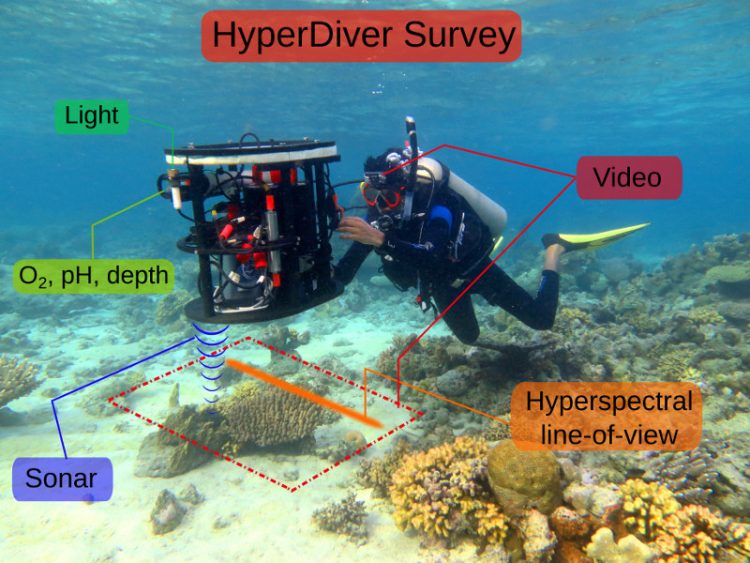Digitizing the coral reef: You can only protect what you know

With the HyperDiver system a diver can scan up to 40 square meters of the reef every minute. The spatial resolution is in the centimetre range. Max Planck Institute for Marine Microbiology
Coral reefs are complex ecosystems with high biodiversity
Due to the complexity and biodiversity of coral reefs, surveying them is generally a complicated and expensive process and only a fraction of the reef could be covered. Now the physicist Arjun Chennu and Marine Biologist Joost den Haan from the Max Planck Institute in Bremen, Germany present a novel approach, by which they create detailed maps of the underwater reef landscape.
Using novel camera technology and an intelligent computer algorithm, they demonstrate how a diver can survey the reef, analyze it and create a map of a large area of the reef in a comparatively short time.
Comprehensive reef mapping
The researchers from the Max Planck Institute in Bremen have now successfully tested the new HyperDiver system in Papua New Guinea. The test site was a coral reef near to natural seeps of carbon dioxide. In the vicinity of these seeps, the coral reefs show signs of stress and damage: a natural ecosystem laboratory for the HyperDiver system to study the effect of ocean acidification on coral reefs.
“The novel development is the collection of underwater spectral images and the analysis by a computer program with a self-learning algorithm,” explains Chennu. “We train the program to identify the reef organisms. This is similar to automated face recognition from video surveillance.”
His colleague Joost den Haan adds: “This technique allows us to create a visual map of the biodiversity of coral reefs. The more coral reefs we map, the better the system can distinguish the variety of coral species. Now it is possible to accurately detect the present condition of the reefs and to monitor any changes.” The researchers are very satisfied with their first results.
With the success of the pilot study, Chennu and den Haan hope that their system will soon be used worldwide towards the monitoring and protection of coral reefs. Here they present the HyperDiver technique in a short video (Youtube link https://youtu.be/v56hAf8SjYY)
For more information contact
Dr. Arjun Chennu
Phone: +49 421 2028 – 832, achennu(at)mpi-bremen.de
Dr. Joost den Haan
Phone: +49 421 2028 – 832, jhaan(at)mpi-bremen.de
Max Planck Institute for Marine Microbiology
www.mpi-bremen.de
Press contact
Dr. Manfred Schlösser
Phone: +49 421 2028 – 704, mschloes(at)mpi-bremen.de
Dr. Fanni Aspetsberger
Phone: +49 421 2028 – 645, faspetsb(at)mpi-bremen.de
https://youtu.be/v56hAf8SjYY youtube video
http://www.mpi-bremen.de Website of the Max Planck Institute for Marine Microbiology
Media Contact
All latest news from the category: Earth Sciences
Earth Sciences (also referred to as Geosciences), which deals with basic issues surrounding our planet, plays a vital role in the area of energy and raw materials supply.
Earth Sciences comprises subjects such as geology, geography, geological informatics, paleontology, mineralogy, petrography, crystallography, geophysics, geodesy, glaciology, cartography, photogrammetry, meteorology and seismology, early-warning systems, earthquake research and polar research.
Newest articles

Trotting robots reveal emergence of animal gait transitions
A four-legged robot trained with machine learning by EPFL researchers has learned to avoid falls by spontaneously switching between walking, trotting, and pronking – a milestone for roboticists as well…

Innovation promises to prevent power pole-top fires
Engineers in Australia have found a new way to make power-pole insulators resistant to fire and electrical sparking, promising to prevent dangerous pole-top fires and reduce blackouts. Pole-top fires pose…

Possible alternative to antibiotics produced by bacteria
Antibacterial substance from staphylococci discovered with new mechanism of action against natural competitors. Many bacteria produce substances to gain an advantage over competitors in their highly competitive natural environment. Researchers…





















